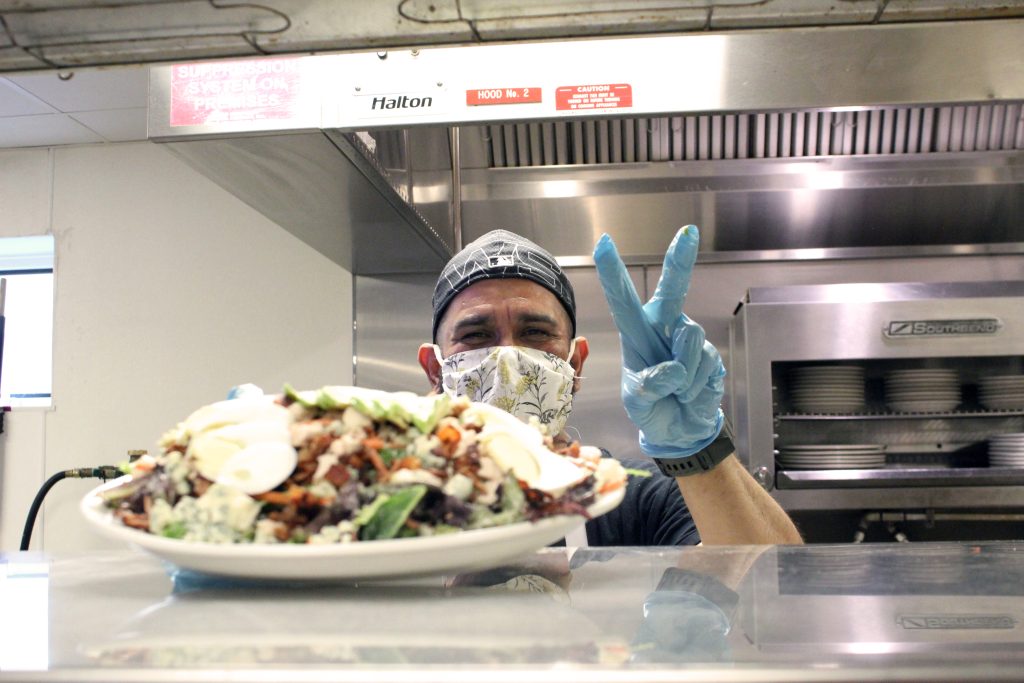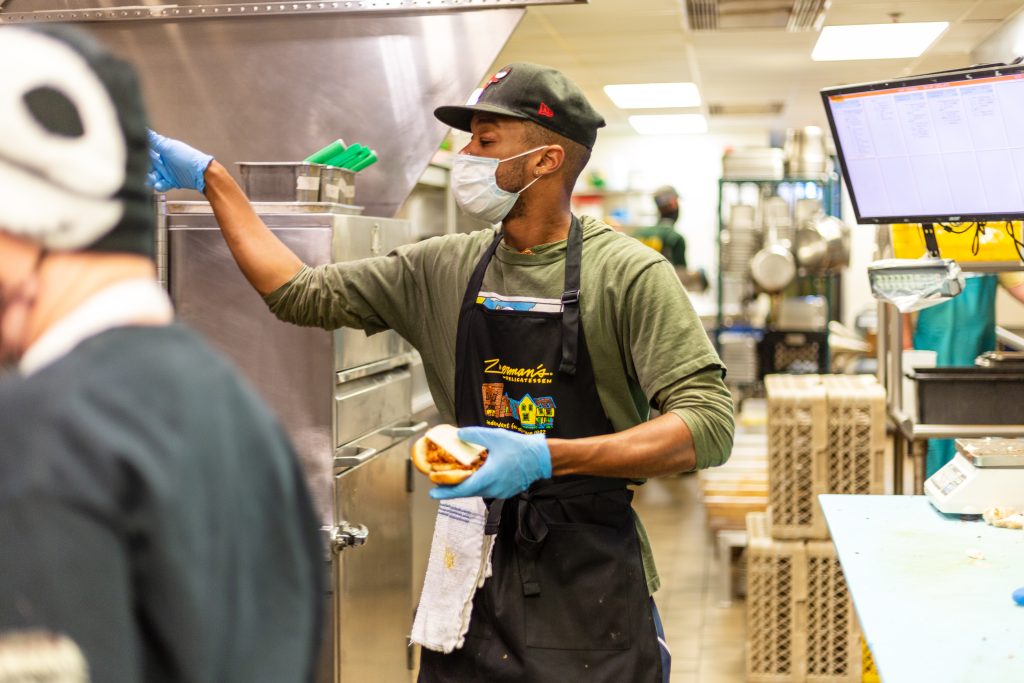The phrase “Servant Leadership” sounds subtle, pleasant, probably sort of soft, maybe like one of those nice throwaway things they write into the opening section of an employee manual. But please don’t let any perception of passivity fool you — Servant Leadership is very strong stuff. Literally, if you really live it (as opposed to just mouthing the words which is a lot easier of course than actually making it a reality), Servant Leadership changes everything. Which includes, in my case, changing me — there’s no doubt in my mind that learning it, learning to live it, and working to get a little bit better at it every day, has made me a much better manager and, because it really is all just one very artful life, a better person in the process.

Servant Leadership is, quite simply, the core component of our management work, the ingredient around which all our other recipes for leadership are configured. Our approach to it is based on a book written back in 1977 by Robert Greenleaf entitled, simply, Servant Leadership. Over the years we’ve worked with, adapted, and adjusted various elements of his teachings, taking them from the theoretical into the practical world of day-to-day leadership here at Zingerman‘s. What follows is our interpretation and application of his approach — the Zingerman’s recipe for effective Servant Leadership. To be straight, if you let only one of the “secrets” in the Guide to Good Leading books out into your world, this is the one I would take. Perhaps more than anything else, it’s the easiest thing that any of us in leadership roles can do, almost immediately upon reading, to help make the world a better place to be and our organization more effective, simply by giving great service to everyone we work with.
To get you a small sense of what Servant Leadership is about, here’s a quick quote: “We should move,” Robert Greenleaf wrote, “towards a new institution that embraces both work and learning — learning in a deep and formal sense and all of the learning influence most people need. This,” he rightly added, “requires a new type of leader, one who can conceptualize such an institution, generate enthusiasm so that many good able people want to be part of it, and provide the strong focus of purpose that builds dynamic strength in many. Great things happen when able leaders create these conditions.”
To live Servant Leadership effectively, each of us has to really embrace the view that we come to work every day with the commitment to do what the organization needs done, to serve the entity as a whole even when that means that what we want or would like as individuals may get short shrift. Specifically we need to work with the mindset that those who “report” to us are actually to be treated as we would our customers, not as they would in the old model of staff on hand to serve our needs. In other words, as CEO, my first responsibility is to the ZCoB. Within that my major customers are the managing partners of the ZCoB businesses. Frank, the managing partner at the Bakehouse, as an example, is one of my big clients. In turn, his primary customers would be the managers at the Bakehouse. Their major customers would be the front line staff that report to them. As you can see, the idea here is to keep the service energy in the organization flowing out, toward the front line hourly staff. Why? Because, far more often than not the front line staff are the ones who are dealing with paying customers and/or making the products we sell. And we want to make sure their energy is freed to give the best possible service to customers coming in the front door, over the phone or via the web. The better the service we give to those frontline customers, the better the entire organization is going to do.
Paradox and Servant Leadership
Servant Leadership creates paradox because it says that, although we hire, pay, promote and have formal authority over our staff, to the best of our ability, we are going to treat them as customers. In the straight sense of service as we define it, that would mean doing whatever they ask us to do. In an extreme literal context that’s neither possible nor advisable. In fact, as servant leaders we’re regularly faced with the question: When is it appropriate to give service to an individual staff member in our classic, “I’ll get right on that, sir” sense of the word? And when is it time to give service to the group around that individual by NOT doing what a staff member has asked for because it’s not in the best interests of the organization overall? I wish I had some easy black and white answer to offer but the reality is rarely simple. We could have an employee ask us to transfer one of their peers because they don’t like working with them. Or they might demand to have their pay doubled because their rent went up. While I certainly don’t begrudge them asking for stuff like that, clearly those are things that we can’t, in good conscience, do just because they asked. That’s not easy to handle. In really extreme cases, we find ourselves having to fire a staff member — possibly someone we’ve worked with and treated as a really good customer for a long time — because it’s right for the organization.
Finally, there is paradox at play here because, at times, what we may want for ourselves can conflict with what is best for the organization as a whole. Certainly, our ideal is that each of us is able to fulfill all our personal goals and meet all of our needs, while simultaneously leading the organization to greatness. But realistically, things don’t always work that way. Which means that sometimes we, as leaders, have to choose to give up what we want for ourselves in the short term in order to provide more for others around us. Which of course may create some level of conflict between what we understandably and justifiably would like and what’s in the best interests of the organization we serve. How do you deal with all these paradoxes? The only way I know to work through them is to get help. Ultimately, in our experience, learning to become a great manager is a lot like learning to become a great taster. To do it you have to practice, and you have to work closely to regularly compare notes and realities with others that have more, or perhaps different, experience. When we act together through this sort of dialogue, sharing of thoughts and concerns, and sound reasoning, we’re a lot more likely to make sound, service-oriented decisions.
Why Bother?

After all that you could well be wondering, “Wouldn’t it be easier to just do this the old way?” Or, maybe you’re thinking, “It’s crazy to give employees service when we’re paying them to perform.” Both of which are certainly really reasonable things to think. Why after all, would you want to work hard to get promoted so that then you could have the chance to work harder? Why would it be worth dealing with all the added burden, complexity and paradox that Servant Leadership requires? Ultimately, each of us has to answer them for his or herself. But, at Zingerman’s, we believe that:
It’s the right thing to do
In any element of life, as we see it, service is the highest form of contribution we can make to those around us. Sure we may want to reap rewards for ourselves, and while there’s certainly nothing wrong with that, ultimately, it’s really much more what we give — not what we get — that defines us as leaders and establishes the legacy that we leave behind in our organizations and in our lives. In our experience our most rewarding work has been when we’ve created a successful Zingerman’s Experience for a staff member who was able grow and contribute here way beyond what anyone expected when they arrived. Knowing that in some small way our service contributed to this staff member’s success is a huge reward.
We get to help others grow and succeed
When they choose to work in our organization, staff members entrust us to provide effective leadership. They give us what can be called “the gift of followership.” In other words, they choose to follow us, allowing us the opportunity to succeed as an organization in ways we couldn’t without them. In return, we as leaders, are responsible for providing an environment to the staff in which they can fulfill their dreams and live up to their potential as participating members of the ZCoB. When we give great service to the staff we’re living this commitment.

Better service to customers
The service our staff gives to our customers will never be better than the service we give to the staff. We’ve seen this over and over again. So if we want to give our guests exceptional extra mile service, then we absolutely, one hundred percent, have to do the same for the staff. We, the leaders, are the ones who will either set the standard for, or, alternatively, hold back the organization’s service quality. The better we get at giving service — to both staff and guests — the better the service the staff give to guests is going to be.
Creates a more appealing workplace
From a strictly strategic perspective, providing great service to our staff can only help to make the ZCoB a better and more appealing place to work. And since we are competing with hundreds of other companies to attract the most creative, hardest working, food-loving staff we can find, this offers a huge strategic edge.
With service we set the tone for our organization
Like it or not, as leaders, we set the example for everyone in our organization. So sure, on the one hand, it seems crazy to give up more of your self-interest when you move “up” the organizational ladder. But the problem is that if we don’t put the organization’s interests above our own, then who will? If the leader sends a message that “I come first,” then it’s inevitable that the same “me first” approach will be the attitude that will prevail throughout the organization. In Sacred Hoops, then-Bulls basketball coach Phil Jackson wrote that, “creating a successful team… is essentially a spiritual act. It requires the individuals involved to surrender their self-interest for the greater good so that the whole adds up to more than the sum of its parts.”
It helps you move toward what you want for yourself
I really believe that the more you give the more you get. And because Servant Leaderhip is all about giving, it only makes sense that if one can get really good at it, it’s going to help make for a more meaningful, more rewarding life. You really will make a difference in the lives of your staff. And that’s a rare and special opportunity.
“Leadership requires selfless results, and these come only from the appropriate use of power and from making the whole more than the sum of the parts… Leaders who seek personal gain at the expense of peers or of institutional results generally lose over the long run.” — from Results-Based Leadership, by Dave Ulrich, Jack Zenger, and Norm Smallwood
The Recipe for Putting Servant Leadership into Practice
Provide an Inspiring & Strategically Sound Vision
At Zingerman’s the Servant Leader’s number one responsibility is to provide a vision for their part of the organization. An inspiring and strategically sound vision is one of the single most motivating things you can offer your staff. The vision is an answer to the simple, yet radical question: “If we’re really successful in our work, what will our organization look like ___ years/months from now?” A vision gets all of us on the same organizational page. It lets the staff know where we’re headed, what tomorrow will look like, what the positive future is that we’re all going after together. Perhaps most importantly it lets them know how organizational success will create a better tomorrow for all involved.
Live and Teach the Guiding Principles
In our Guiding Principles we detail how we will relate to those around us — staff, guests, suppliers, community — during our stay in the organization. As leaders we have a huge responsibility to live these principles day in and day out in our work. You can read them in the Zingerman’s Staff Guide (available at www.shop.zingtrain.com).
a) Treat the staff with dignity at all times.
We don’t have to agree with them, we don’t have to like them, we don’t have to be happy to see them, but we really do need to treat them in a dignified manner if want this to work.
b) Show that you care about them as individuals.
This doesn’t mean you’re responsible for their lives, nor does it mean you have to fix their problems for them. It does mean that you take a minute to ask how their vacation was, to ask how they’re feeling, how school’s going, how their family is, where they’re from. Show them that you know they have a life outside of work
c) Don’t hold grudges.
Although most of the world continues to carry them, our experience here is that grudges get you absolutely nowhere. At least nowhere good — they just suspend you in an angry, unproductive past. Hey, I know that employees err; sometimes they completely screw up. But the past is the past, and it’s over. Because we’re committed to giving great service to the staff, and because we’re not on Planet Fair (even though we should be), as servant leaders we commit to taking a forgiving approach. This doesn’t mean that you don’t hold firm on appropriate agreed upon consequences. It just means that you’re going to look forward toward a positive mutually rewarding future rather than let yourself get locked into an old grudge for past behaviors.
d) Be professional.
Return phone calls promptly. Stay away from gossip. Don’t talk smack about the organization or its members in front of staff members.
e) Have the courage to engage in caring confrontations.
This is an area in which Servant Leadership appears to diverge from a straight customer service approach. While I often see ways for our customers to alter their attitude or behavior to get the results they say they want, unfortunately it’s only very rarely appropriate to tell them. But in a management context, when a staff member who reports to us isn’t living up to our expectations, then it would actually be poor service — to them, and to the organization — NOT to tell them. Without our perspective, without a clear understanding of our expectations, we’re undercutting the staff member’s chances of success. In fact, the less they know about what we want, the less we share our concerns constructively, the lower the likelihood that they will succeed in their work. Which would be the exact opposite of what we we’re supposed to be doing.
Be an Active Learner & Teacher
Speaking of expectations this is totally one of those things that Paul and I had in our heads from day one. We’ve already been really active readers, we’ve always made time to go to seminars and classes, and we started teaching — both formally and informally — very early on in our work. It just seemed incredibly obvious that without that learning and teaching we were never going to have even the slightest shot at getting to where we wanted to go. BUT… as we grew and brought in more managers to lead, we found ourselves increasingly frustrated that many of them didn’t seem to have the same passion for these two things that we did.
Then one day in the fall of 1991 or 1992, we went to an Inc. Magazine conference in San Francisco where we had the chance to hear Skip LeFauve, then head of the Saturn Corporation, present on what he and his crew were doing to make a new kind of car company at their plant in Tennessee. One of the many things he shared was this expectation for learning and teaching. We loved it and we’ve been using it ever since.
(Turns out that Skip and his family lived in Ann Arbor and were good Zingerman’s customers. Over the years I had the opportunity to wait on him many times and to casually share thoughts and learn from his experience and insight. Sadly he passed away in 2003 at the young age of 68. While we never worked together directly I have the feeling that he lived much of what’s in this book in creative and inspirational ways.)
Help Staff Succeed by Using the Training Compact
This is one of the most difficult, most important and ultimately, most rewarding parts of our work as servant leaders. The most important and effective way we can do that is by living the Zingerman’s Training Compact. In a nutshell,
The Zingerman’s Training Compact
- Gives clear Bottom Line performance expectations
- Gives the resources to do the job
- Recognizes performance
- Rewards performance
In return the Staff:
- Takes full responsibility for the quality & effectiveness of our training.
Say Thanks
- Saying thanks is one of the key responsibilities we have as servant leaders. Why?
- Everyone — you and me included — works more effectively when their efforts have been noticed and appreciated.
- Ultimately, saying thanks and recognizing people’s contributions is one of the best ways to let people know that their efforts have really made a difference.
- It’s a more effective and enjoyable way to work to be leading with appreciation than to lead with criticism
- When we say thanks, we set the tone to move our organizational culture towards a more appreciative, positive future.
Because effective leadership is a craft not a science, there is no philosophy we can give you that will guarantee simplistic, multiple-choice solutions to complex management problems. What Servant Leadership can do is provide you with a framework in which to function: a set of guidelines and approaches to which you can return again and again as you grapple with the difficult, ever-challenging issues of effective leadership.



